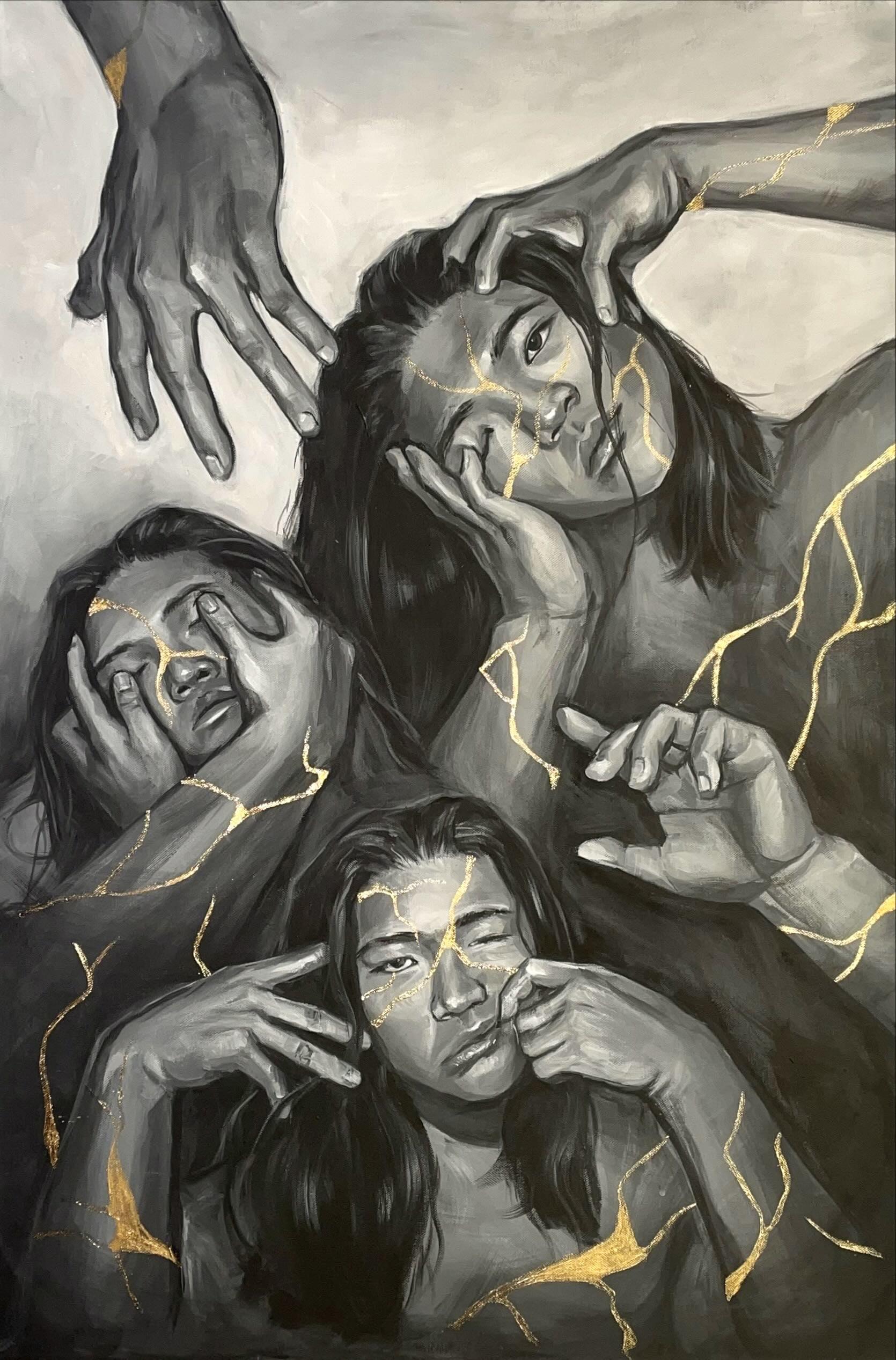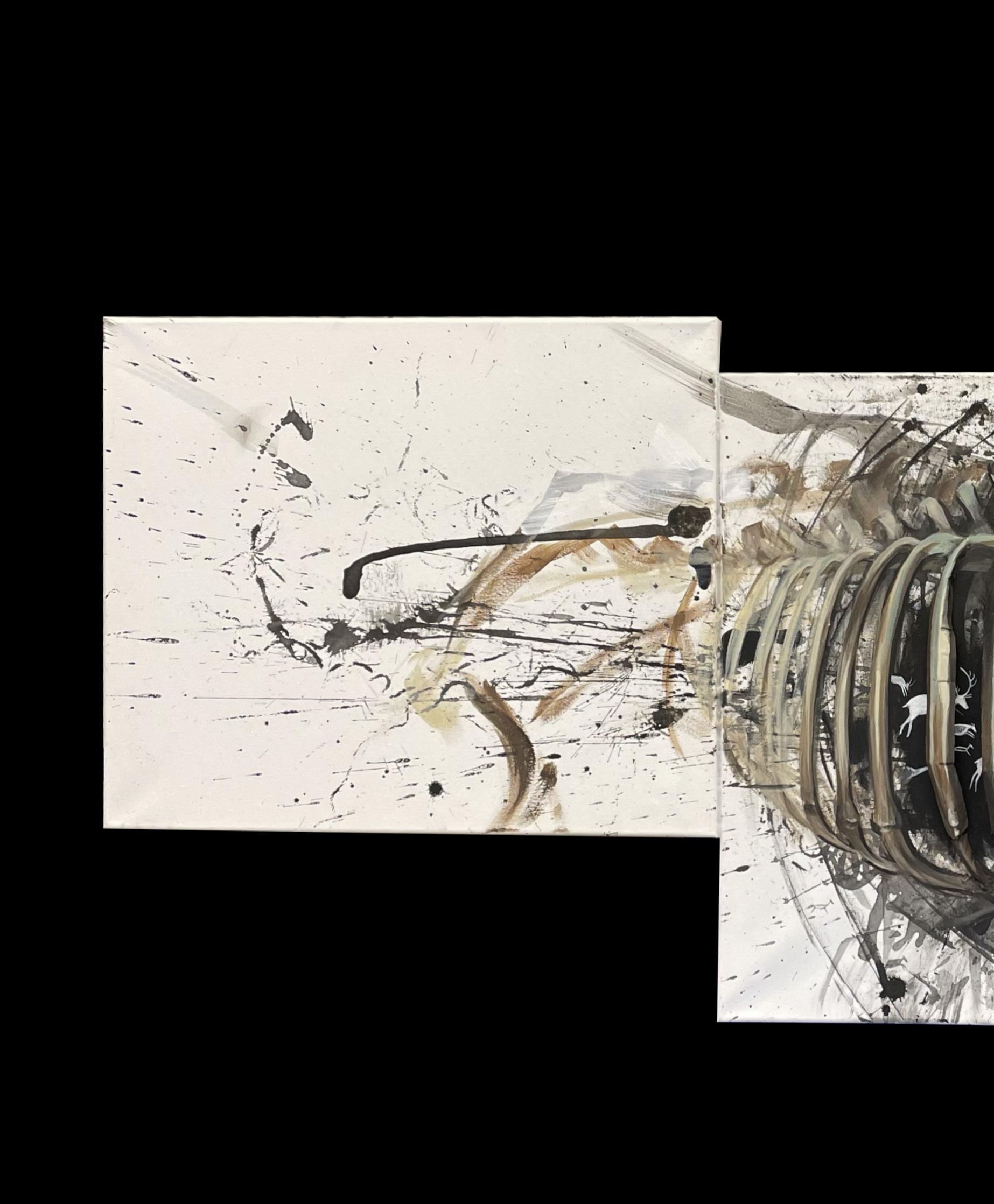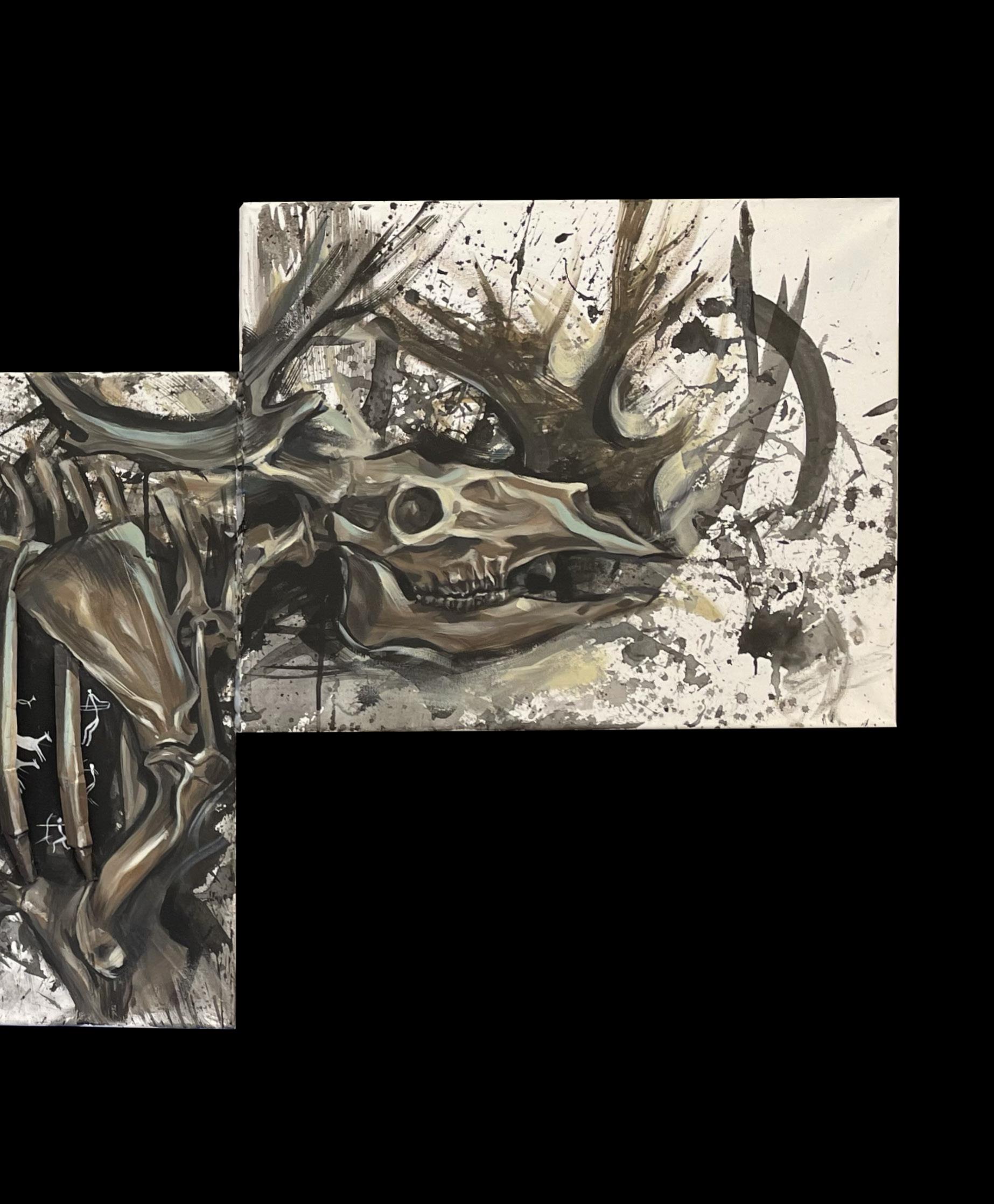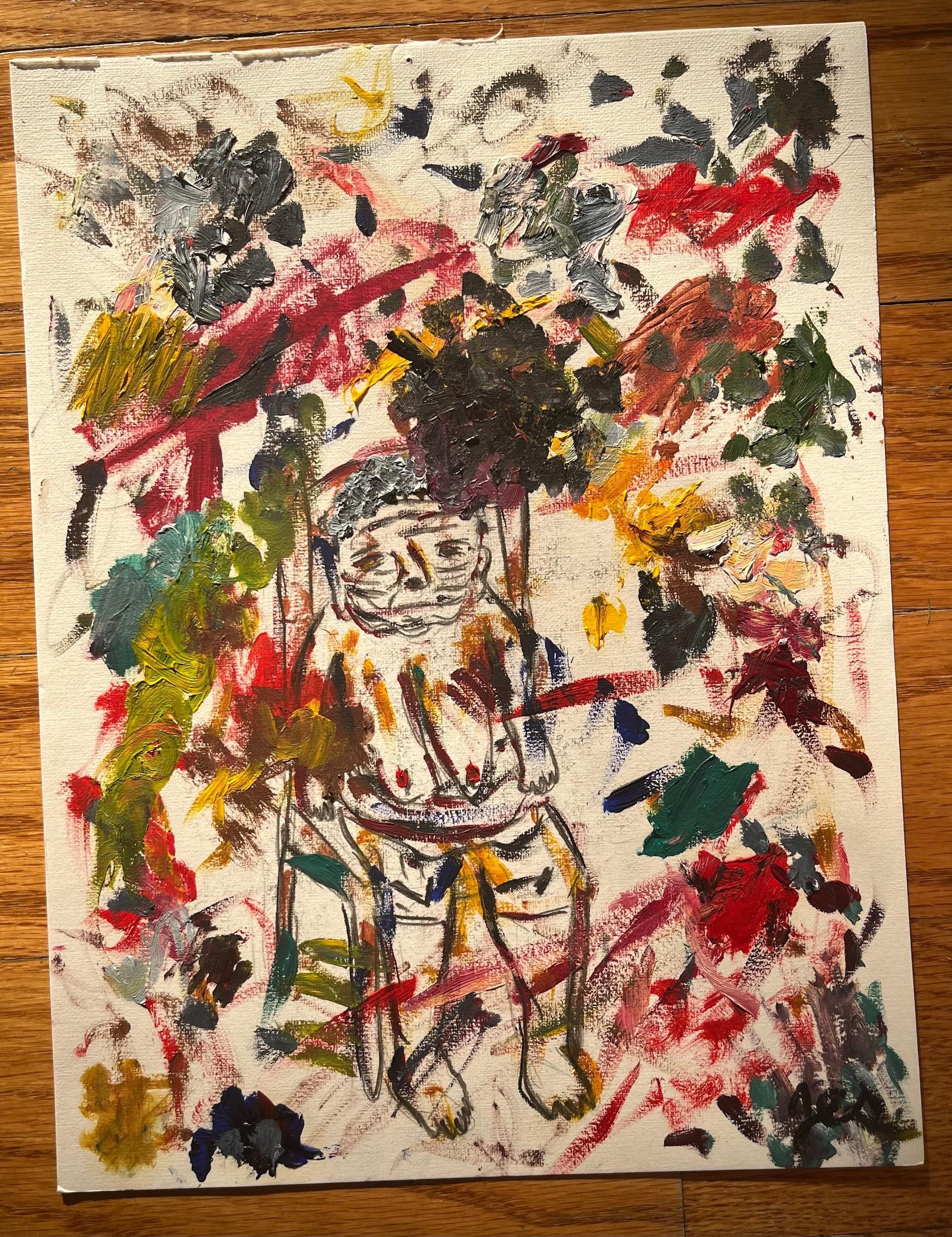
7 minute read
THE SOUTHWEST CORRIDOR
from Grotonian Draft
by Amy Ma
Amos Lawrence
“Peace out.” Shit. Brutal choice for the last couple words I’ll probably ever end up saying to her. The red tile maze of the Harvard Square station swallows me whole; I pass the train map where she kissed me goodbye for the first time. As I slipped between the plexiglass panes of the terminal I looked down at my Charliecard, a slip of plastic embellished with a smiling man in a silver suit. There’s a song about him that my mom used to sing to me, and its tune rings between my rings. Yet I can’t quite place the words, pieces of a memory too far gone. Later I found a trace of her white eyeliner on my eyelash, a blade of grass on a freshly mown endline. I slept dreamlessly that night. My train comes; I swear I always get an old, beat-up car on the way home—the orange and white turned a uniform brown. “8TEEN” by Khalid starts to play, the halfway point in his debut album, American Teen. This is the only album I’ve ever listened to “properly,” like some kid in the sixties with his favorite record: intro to outro, and every song transition. It's not even that good, just the only album I could listen to in 7th grade because it was clean. Except “8TEEN.”
Advertisement
The split was going well, we talked honestly and gave each other little smiles. Enough to show compassion but not enough to show happiness. Then we frowned, but the satisfactory kind of frown. The kind of frown that doesn’t sting like a cut, but aches like a bruise—the kind of bruise that was worth the adventure that caused it. We sat on the Cambridge esplanade, on a bench a touch big but also much too small. After we finished talking we sat there, wordless— witnesses of a fruitless sky. It was my idea to end it, believe it or not. It's been weighing on me for a while now, an unwelcome bat in the attic of my head. She’s great, special even; yet I’ve found the need to remind myself of that fact more and more—like I’d somehow forgotten.
Ruggles. The doors here transfigure my mother into Professor Ruth McNeil, clad in leather jackets and boots and chunky plastic necklaces that rattle like a box of legos. Whenever she wears her work perfume I get bitter; I think I read an article online that smell and emotions are connected in the brain somewhere. Here she speaks slower, smiles less. Her friends have jet-black bobs, not long brown hair. I don't like the way her mouth draws to a purse, the way her eyes turn downward. Every once and a while I'll ask her about coming to visit. I always framed such suggestions as playful, as opposed to the pleas for authenticity they are. I’ve always teased her about never figuring out how to stop going to school; She’s never laughed.
Her family jarred me the first time I met them. They acted like friends, talking, cracking jokes. Her dad shook my hand with a knowing smile and whispered to me, “I’ll get her brother out of here as fast as I can,” behind the back of his hand. Still smiling he let loose a hearty chuckle and clapped me on the back. And he was cool too; he had been a combat photographer during the period of violence following the dissolution of Apartheid in South Africa. His work was so important that he won a Pulitzer Prize in 1991, a far cry from my dad’s career of drabness. Her mother gave me a seven-second hug with several back pats and a warm squeeze at the end.Her brother was neat too, he showed me the Motorola kx500 he was working on and his way over the top PC. But I didn’t feel secure, didn’t feel relief in this escape from 16 years of staleness—I felt alien. This wasn’t what I was used to, what I could deal with. I was used to cordial family dinners, business meetings minus the suits and salary.
An elderly woman with a cart—the silver kind that splits open—boards the train at Stony Brook. More often than I’d like to admit I rashly assume people like her are homeless, a misconception of unambiguous origin. My dad taught me to stereotype.
“It's faster than asking and works good enough,” he would always say, eyes aloof. Her flats are grungy, her hands sit clasped in the lap of her tattered black coat. But despite the bumps and scuffs on her clothing, her posture is impeccable; she sits just as my grandmother taught me to. They look alike, the lady and my grandmother. Same shoulder length silver hair, same pockmarked hands. She even has on one of those faux fur headband/crown things that my and every other grandmother seems to wear. On cue, My airpod falls out of my left ear and bounces across the bruised tile, directly on course for the old woman. She picks it up and tosses it back across the car with a warm smile. This catches my attention. With my grandmother, smiles were earned. You got them for perfect grades or an excellent game. Dropping an airpod was bothersome and created a mess, and therefore would have resulted in a cinched brow and a not-so-soft sigh. But not from this lady. Her smile is easy, but not cheap. She gets off at Roxbury crossing. I hope she has grandkids.
My first girlfriend felt like a drug addiction. Long periods of rot and decay punctuated by moments of bliss. Worry and overthinking would gnaw at my head and shoulders until her hands would soothe them. I felt like I never truly had a full grasp of her, like I only ever held shards of her attention. When she didn’t smile at me right my day would derail. Self-doubt and anxiety ran rampant through me, seizing me by the ribs arbitrarily. Not her. She’s always been easy: to meet, to like, to break up with. She did everything right. Her eyes lit up every time she saw me, she made me tea in the soft glow of her kitchen light, she made me bracelets from tie-dyed twine. It was simple. Not simple in the unintelligent sense, but simple in the way a soft serve ice-cream-cone is. But, eventually, I got sick of the sweetness. The cone only tastes good so many days in a row before its banality begins to disintegrate the warm blanket of sugar, it only really tastes good because of all the days where it isn’t eaten.
State Street. This is where my dad gets off for his job, but—unlike with my mom—I never really had a problem with that. He’s a simple person, and definitely in the unintelligent sense. Monotony conducts his life, from his twenty-three identical 18/34 Brooks Brothers blue button downs to the manicured way he folds his Financial Times. He goes to the same Au Bon Pain every morning and buys the same 45 cent refill—black, of course, no cream or sugar—in the same cup he got seven Christmases ago. The inside is so stained you have to tip it over in order to see if it's full, but he says spending the 8 dollars to buy a new one would be “superfluous”—his word, not mine. One time he did the math to show me how much money he had saved on coffee since he got the cup. It was the happiest I’d seen him in a couple months. He allotts 45 minutes for dinner each night, our “family time” where we run through what seems to be the same predetermined script every night.
“How was school?” he says, peering across the table through his wire rimmed glasses.
“Good” we say in unison, eyes placed squarely on the 2 ⅓ Trader Joes meatballs and cup of basmati rice placed in front of all three of us. Some nights we got desert, but we always had to split it.
Sometimes I don't even know why she even liked me in the first place. I took her affection for granted, I know that, but I just didn't know how to handle it. Every time I would pull back a little—just for space, to reset—she’d lean in to fill the gap. All of her all the time started to get to me, and I began to drift away. It's frustrating, to try and force yourself to like someone you can feel slipping from the corners of your mind. That’s selfish though, I know that, it's a lot more frustrating to force someone to like you.
As I rumbled through Downtown Crossing I caught a glimpse of my favorite person in the city: The train platform convenience store guy. He has a heavy South Asian accent and he only has five oil-slicked teeth left, and for some reason he always has on the same black leather jacket. His store can’t be bigger than a shipping container—he sells everything through a window, you can’t even go inside— but he makes use of every last inch. He has the classics, every conceivable chip flavor and form of nicotine, but he has his own trademarks: loose candies hand bundled in Saran wrap and his famous oatmeal creme pies. I lied actually, the only classic he doesn’t sell is the Little Debbies version, because he can sell his for more. Honestly though, I don't have a whole lot of valid evidence for his status as my favorite Bostonian—I haven't had a conversation with him spanning more than a couple seconds. He’s just happy. Unshakably, resolutely happy. No matter the hour or the weather, he’d stand there—never sit—and work unabashed. While waiting on the platform I’d always watch people go up and buy things from him, the corners of their mouths seemingly buoyed by their purchase. But whenever I went up to buy my peach Snapple and mild Slim Jim I never quite knew what to say.
When I was talking myself into breaking up with her I kept telling myself that she just isn’t right for me. This is wrong. She is exactly what I need, just not what I am capable of handling. The truth is, whenever she smiled at me I couldn’t help but look away.
The train rolls into Green Street, my stop. All the stops in the Southwest Corridor look the same: rough-hewn concrete and the ghost of I-95, but each one feels different. I know this one, I know it well. I know the dirt path through some poor guy's backyard that leads to my house, the absurdly unsafe water park across the street, even the pile of ill-used needles behind the broken ticket machine. The doors groan open, a choir of ailing hydraulics. I step on to the grim bricks of the platform and watch as an inbound train pulls into the opposite platform. I get on—not for her, or the stops along the way, or even for the convenience store guy—but because there isn’t a place for me at either end of the line.











